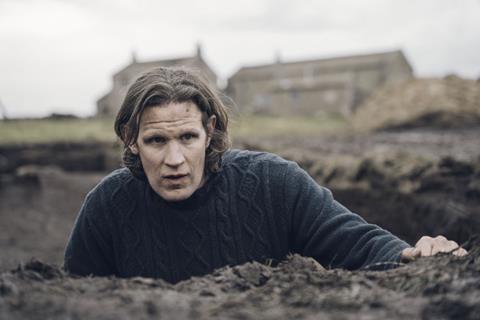Matt Smith and Morfydd Clark struggle to deal with tragedy in Daniel Kokatajlo’s 70s-set folk horror

Dir. Daniel Kokotajlo. UK. 2023. 98 mins
British director Daniel Kokotajlo’s 2017 debut feature Apostasy was firmly rooted in the everyday, and in the film-maker’s own biography. His follow-up Starve Acre is woven from fantasy of a very dark strain, yet it has the great virtue of capturing a certain poetic drabness that is inseparably bound with our cinematic memories of ’70s Britain. Based on the 2019 novel by Andrew John Hurley, this densely atmospheric folk horror yarn – with a stylistic finesse that makes it very much an art chiller – will have strong appeal to discerning genre fans, not least because of the presence of Matt Smith and Morfydd Clark (the lead in much-admired psychological chiller Saint Maud). Perfectionist direction and subtly unsettling mood give a bespoke edge to what would otherwise come perilously close to being a Gothic shaggy dog story (although a dog is not the beast at issue here).
If Starve Acre seems to walk on well-trodden ground, Kokotajlo is nevertheless adept at inhabiting and revitalising the material
The setting is the Yorkshire countryside at some time in the ’70s, around the house where archaeologist Richard (Smith) was raised by his troubled, abusive father Neil. After Neil’s death, Richard has resettled there to seek reconciliation with the past, together with his wife Juliette (Clark) and their young son Owen (Arthur Shaw). But Owen has been prone to volatile incidents at school, and one very disturbing act leads his parents to worry about him – especially as he claims to hear strange sounds that include whistling from ‘Jack Grey’, a wood sprite according to local lore.
Then tragedy strikes, causing the agonised couple to drift apart within their home. Richard’s way of escape is to devote himself to digging the land, where his father once pursued his own research project – at once historical and occult – which he recorded in a strange journal. Richard unearths finds the preserved roots of an ancient oak, chopped down long ago, and a strange relic that comes to play an increasingly baleful role in his and Juliette’s lives.
The less revealed about Starve Acre’s plot, the better – especially as, well-honed special effects notwithstanding, we eventually enter territory that might get incredulous guffaws from viewers of a genre-sceptical disposition. But with this type of narrative, accepting the fantastic is as essential leap of faith for the audience as it is for the characters, whose understanding of reality will be transformed in the course of events – sometimes with shocking abruptness. Suffice to say, Kokotajlo keeps us guessing about what will happen around the family home, especially given the couple’s interaction with outsiders, including neighbour Gordon (Sean Gilder), Richard’s fellow academic Steven (Robert Emms, returning from Apostasy), a matronly local woman with a penchant for candlelit healing (Melanie Kilburn), and Juliette’s sister Harrie (a nicely perplexed Erin Richards).
If Starve Acre seems to walk on well-trodden ground, Kokotajlo is nevertheless adept at inhabiting and revitalising the material. Familiar themes and moods haunt the film with their own uncanny insistence. The theme of grief inescapably recalls Don’t Look Now (although Kokotajlo doesn’t opt for Roeg-style dislocation) while, by the end, things get rather more Polanski-like. Starve Acre is very much in the folk horror vein currently so prominent in British cinema, as practised variously by Mark Jenkin (Enys Men), Ben Wheatley (In the Earth) and Alex Garland (Men). But in its command of style and imagery, the film also has its roots in ’70s TV drama such as David Rudkin’s Penda’s Fen and the vintage BBC adaptations of M.R. James – with a hint also of Jerzy Skolimowski’s bizarre 1978 English-set psychodrama The Shout.
Francesca Massariol’s production design and Emma Fryer’s costumes have the ’70s rural look to a tee, from wallpaper and heavy timber doors to chunky crochets – successfully recreating the era while avoiding stylistic caricature. The atmospherics are magnificently eerie too, the screen sometimes steeped in ominous wintry mists that seem to emanate from something other than simply the weather. And DoP Adam Scarth, who also shot Apostasy, contrives to give an oddly invasive presence to a subtle yet troubling little patch of blue glare that sometimes inhabits the image.
As things move to a disturbing, yet economically handled payoff, the film’s shift into the realm of the all-out bizarre is held neatly in check by naturalistic, quietly intense performances. Smith, sporting floppy post-hippie hair, is increasingly rueful and introverted as a rationalist who finds himself headed down a tunnel of furtive obsession; while Clark projects a sometimes childlike vulnerability that comes as the reverse side of a fiercely protective rage.
There may be a point in Starve Acre – arguably earlier than later – when even viewers who aren’t genre specialists will twig to where all this going. But that doesn’t detract from a stylishly compelling piece that gains an extra idiosyncratic layer from the score by eclectic British composer Matthew Herbert, whose filmography includes several collaborations with Sebastián Lelio (most recently The Wonder). His sonic effects, such as the combination of sweet harp and keening violin, signal that if there’s a bustle in the hedgerow – whatever Led Zeppelin might have told you – you have every reason to be alarmed
Production companies: House Productions, Access Entertainment, BBC Film
International sales: Cornerstone Films jm@cornerstonefilm.com
Producers: Tessa Ross, Juliette Howell, Emma Duffy
Screenplay: Daniel Kokotajlo, based on the book by Andrew Michael Hurley
Cinematography: Adam Scarth
Editing: Brenna Rangott
Production design: Francesca Massariol
Music: Matthew Herbert
Main cast: Matt Smith, Morfydd Clark, Arthur Shaw, Erin Richards
























